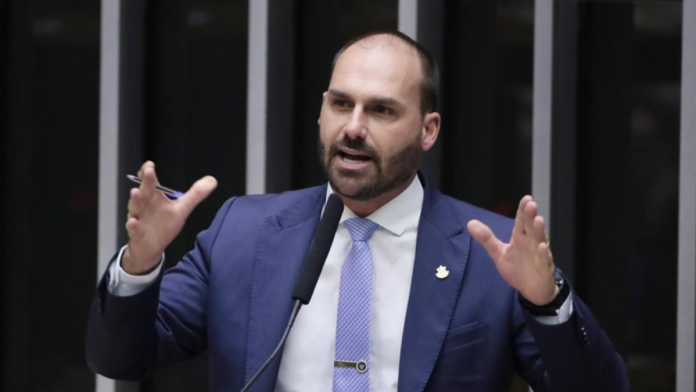The relationship between the United States and Brazil is facing a serious test. The United States, under President Donald Trump, might soon increase pressure on Brazil by imposing fresh sanctions linked to a major trial against former Brazilian president Jair Bolsonaro. Bolsonaro is accused of trying to overthrow democracy, sparking a heated conflict between two of the Americas’ biggest democracies.
US Considers Stronger Sanctions Amid Bolsonaro Coup Trial
Congressman Eduardo Bolsonaro, son of Jair Bolsonaro, has warned that the United States government is preparing to take tougher action. He says President Trump could punish more Brazilian officials who refuse to stop the trial against Bolsonaro. These punishments might include new sanctions, visa bans, and even tariffs—taxes on imports that make goods more expensive.
Earlier this year, the United States already imposed harsh penalties on Alexandre de Moraes, a judge on Brazil’s Supreme Court overseeing the trial. The US Treasury accused Moraes of using censorship, unfair arrests, and politically motivated prosecutions. The United States froze Moraes’ assets and banned American companies and citizens from working with him. This is known as a Magnitsky sanction, targeting officials linked to serious human rights abuses or corruption.
📉🇧🇷 Trump’s trade strike backfires — Brazil cuts off dialogue, eyes India in high-stakes pivot
Eduardo Bolsonaro has met with officials in Washington and said he knows President Trump has many options on the table. These could range from sanctioning more judges and their families to new visa restrictions and trade barriers. The goal is to stop the trial, which President Trump and Bolsonaro’s supporters call a “witch-hunt.”
Brazil Pushes Back Against US Pressure
Brazil’s current president, Luiz Inácio Lula da Silva, has rejected what he calls “unacceptable” US pressure. Lula’s government and the Brazilian Supreme Court have promised to continue the trial despite the sanctions and threats from the US.
Judge Alexandre de Moraes recently ordered even tougher measures against Jair Bolsonaro. The former president is now under house arrest after being found guilty of breaking court orders related to social media. The court also banned communication between Bolsonaro and his son Eduardo, who has been lobbying hard in the United States to protect his father.
Bolsonaro’s son storms Washington — U.S. sanctions Brazilian Supreme Court judge Moraes
The political clash has spilled over into trade relations. The Trump administration raised tariffs on Brazilian goods to 50% and banned eight Brazilian Supreme Court judges from traveling to the United States. These moves have worsened ties between the two countries, already tense because of political differences and the trial.
European Support Sought Against Brazil’s Supreme Court
Eduardo Bolsonaro is also seeking European support to pressure Brazil’s top court. He plans to visit Europe to push for sanctions by the European Union against the judges involved in Bolsonaro’s trial. Some right-wing European politicians, including André Ventura from Portugal and Dominik Tarczyński, a Polish Member of the European Parliament, have called for travel bans and asset freezes on the judges.
Brazilian banks race to comply with U.S. sanctions on supreme court justice
They have written to Kaja Kallas, the European Union’s high representative for foreign affairs, urging targeted sanctions against Moraes and his allies for “egregious human rights violations.”
Critics in Brazil say Eduardo Bolsonaro’s campaign has hurt the country’s economy by causing higher tariffs and job losses. But Eduardo insists his actions are meant to defend democracy, even if he faces harsh criticism at home.
This conflict shows growing international tensions involving Brazil’s government, its courts, and foreign powers. The trial’s outcome and the global responses will continue to shape political and economic relations between the US, Brazil, and Europe.


